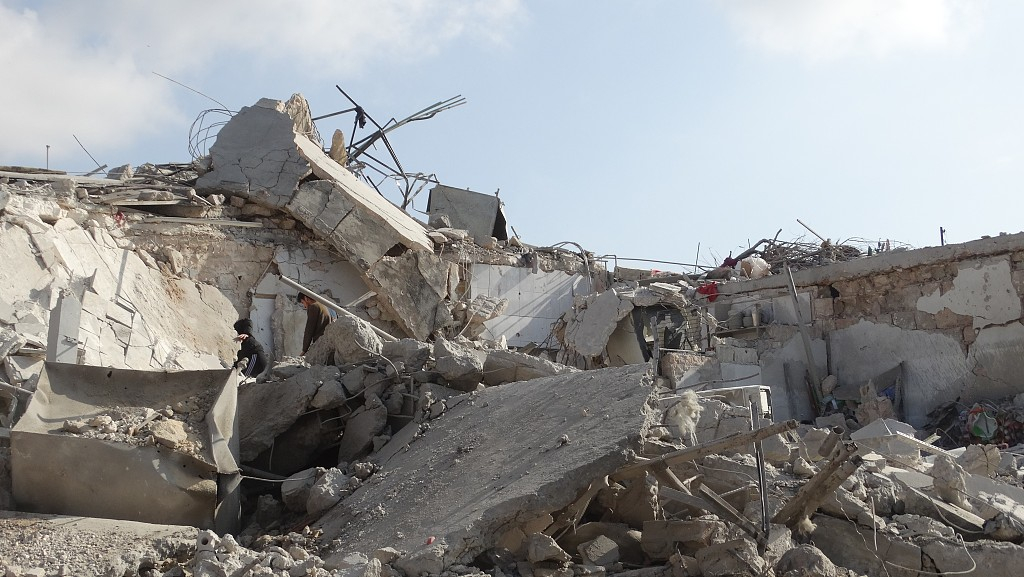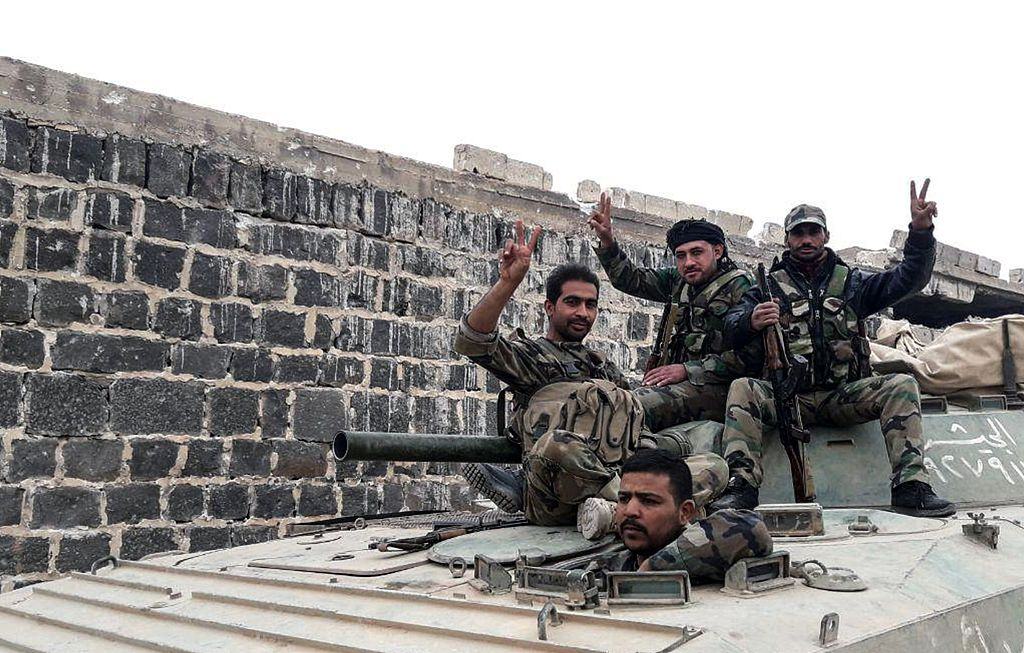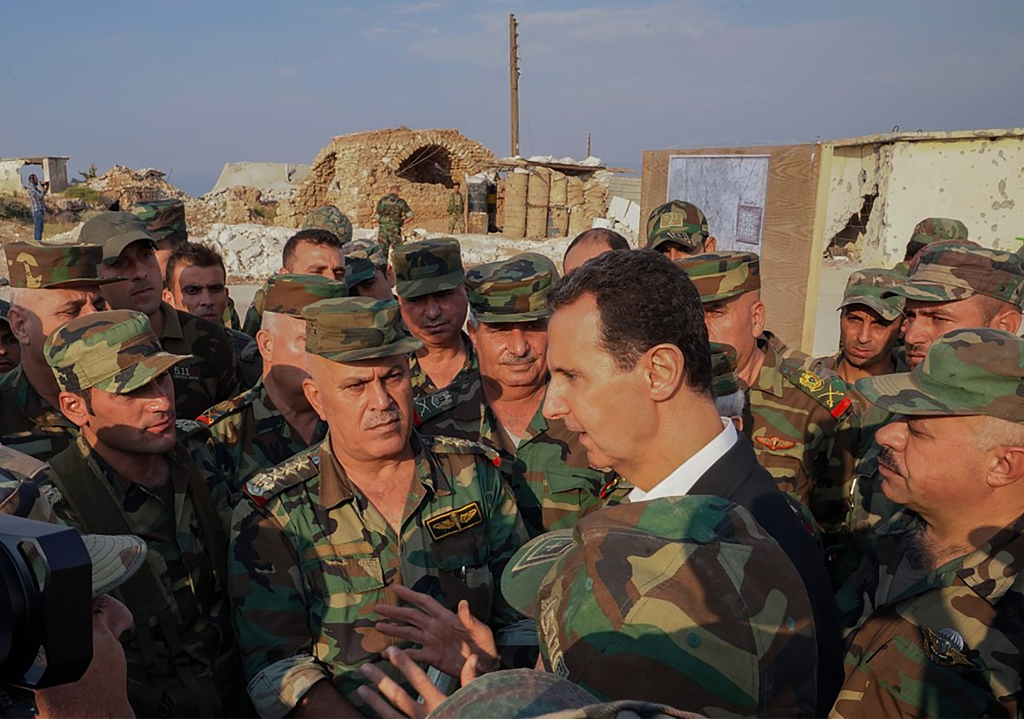Unfortunately, it may be unrealistic to have much expectation from the upcoming Astana peace talks set for December 10-11 at Kazakhstan's capital Nur-Sultan.
This will be the 14th meeting and though there is still hope for some progress to be made, it is unlikely to be fast-paced. Turkey, Russia and Iran are acting as guarantor states while representatives of the Syrian government and the opposition are expected to participate as well.
There are several issues however that may negatively affect the process, which has already been lingering.
On Saturday December 7 – with just days until the Astana meeting, Idlib was hit once again.

A view of damaged buildings after airstrikes by Syrian government and Russia in al-Bara village of Idlib, Syria, December 7, 2019. /VCG Photo
A view of damaged buildings after airstrikes by Syrian government and Russia in al-Bara village of Idlib, Syria, December 7, 2019. /VCG Photo
The British based Syrian Observatory for Human Rights reported at least 20 people were killed by Syrian government and Russian air strikes.
Idlib is the last major rebel-held territory, an area Syrian President Bashar al-Assad is determined to retake. Actually, Assad has vowed to regain control of every corner of Syria and Idlib is basically a priority.
So each time an operation against opposition forces make gain in Idlib – Assad is one step closer to his goal, it may appear that he is a little bit stronger at the negotiation table.
But Assad has not only gained back control of certain territories through his own military operations.

Syrian army soldiers in the southern Idlib countryside after reportedly recapturing the area, November 25, 2019. /VCG Photo
Syrian army soldiers in the southern Idlib countryside after reportedly recapturing the area, November 25, 2019. /VCG Photo
In October, Turkey launched a cross border operation into Northern Syria against the Syrian Kurdish Group YPG as Ankara considers the YPG a terrorist organization.
An ally of the YPG in the fight against ISIL – the United States – decided to pull out of the region. That U.S. decision left the YPG with no protection so the Kurdish group turned to the Syrian government for help.
Assad's troops wasted no time and quickly took over critical areas such as Manbij and Kobane, which they had not entered since rebels had seized them around 2012. Aside from Turkey, the Syrian government and its main backer Russia were ones who gained from Ankara's offensive against the YPG.
In the meantime, Assad has repeatedly expressed his discontent regarding Turkey's presence inside Syria.

President Bashar al-Assad talking to Syrian soldiers in al-Habit on the southern edges of the Idlib province, October 22, 2019. /VCG Photo
President Bashar al-Assad talking to Syrian soldiers in al-Habit on the southern edges of the Idlib province, October 22, 2019. /VCG Photo
Furthermore, it was one of the reasons the Syria Constitutional Committee meeting in Geneva on November 20 did not end so well.
It was reported that the government's delegation requested preconditions before the talks were continued. No such preconditions had been set – in fact, they violate the committee's rules of procedure.
The opposition spokesman Yahya Al-Aridi stated that one of the issues the delegation wanted to discuss as a precondition was condemning Turkey's operations in Northern Syria. If progress had been made in Geneva, that would have likely been a push forward for Astana as well.
For its part, Turkey says it has no intention of leaving Syria without reaching its goals. Turkish President Tayyip Erdogan met with leaders of the so-called "quartet "comprising of France, Germany and the UK, on the sidelines of the NATO summit in London.

France's President Emmanuel Macron, Britain's Prime Minister Boris Johnson, Turkish President Tayyip Erdogan and German Chancellor Angela Merkel pose as they meet at Downing Street ahead of the NATO summit in London, Britain, December 3, 2019. /VCG Photo
France's President Emmanuel Macron, Britain's Prime Minister Boris Johnson, Turkish President Tayyip Erdogan and German Chancellor Angela Merkel pose as they meet at Downing Street ahead of the NATO summit in London, Britain, December 3, 2019. /VCG Photo
Erdogan stated that Turkey cannot leave Syria without establishing peace between the Tel Abyad and Rasulayn – an area about 420 kilometers wide and 32 kilometers deep.
Erdogan hopes to establish a safe zone there and believes nearly 2 million refugees can be relocated there, and he expects them to leave voluntarily.
The plan is an ambitious and challenging one that would require massive financial investment – as Turkish officials have stated the building of infrastructure, such as hospitals, schools, and housing would cost about 27 billion U.S. dollars.
So while all parties agree on the usual goals – to preserve Syria's sovereignty and territorial integrity, the fight against terrorism and the need for a long term peaceful solution for Syria – how they will get there is still a difficult question that will likely take many more rounds of talks.
(Cover: Children stand in a rainwater puddle before tents in a flooded camp for displaced Syrians near the village of Killi in the north of the northwestern Idlib province on December 5, 2019. /VCG Photo )